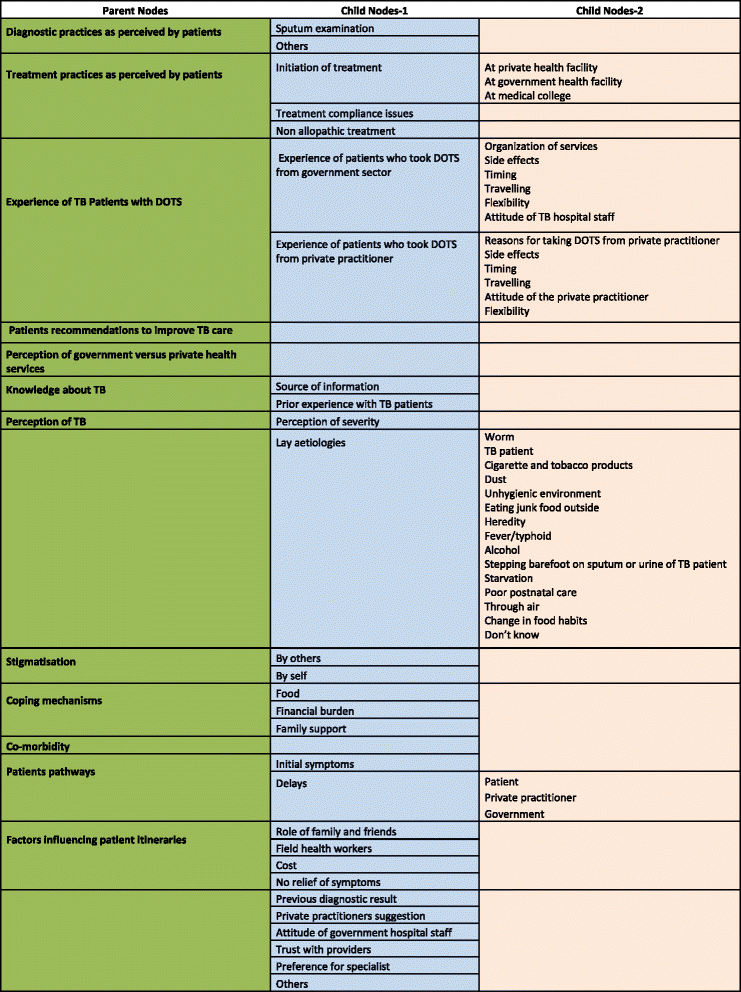Coping with tuberculosis and directly observed treatment: a qualitative study among patients from South India
- PMID: 27430557
- PMCID: PMC4950693
- DOI: 10.1186/s12913-016-1545-9
Coping with tuberculosis and directly observed treatment: a qualitative study among patients from South India
Abstract
Background: In India, the Revised National TB control programme (RNTCP) offers free diagnosis and treatment for tuberculosis (TB), based on the Directly Observed Treatment Short course (DOTS) strategy. We conducted a qualitative study to explore the experience and consequences of having TB on patients enrolled in DOTS and their caretakers in Tumkur district, located in a southern state of India, Karnataka.
Methods: We conducted 33 in-depth interviews on a purposive sample of TB patients from three groups: (1) patients who reached RNTCP directly on their own and took DOTS at RNTCP; (2) patients who were referred by private practitioners (PPs) to RNTCP and took DOTS at RNTCP; and (3) patients diagnosed by RNTCP and took DOTS from PPs. Data was analyzed using a thematic approach with the support of NVivo9.
Results: The study revealed that TB and DOTS have a large impact on patient's lives, which is often extended to the family and caretakers. The most vulnerable patients faced the most difficulty in accessing and completing DOTS. The family was the main source of support during patient's recovery. Patients residing in rural areas and, taking DOTS from the government facilities had to overcome many barriers to adhere to the DOTS therapy, such as long travelling distance to DOTS centers, inconvenient timings and unfavorable attitude of the RNTCP staff, when compared to patients who took DOTS from PPs. Advantages of taking DOTS from PPs cited by the patients were privacy, flexibility in timings, proximity and more immediate access to care. Patients and their family had to cope with stigmatization and fear and financial hardships that surfaced from TB and DOTS. Young patients living in urban areas were more worried about stigmatisation, than elderly patients living in rural areas. Patients who were referred by PPs experienced more financial problems compared to those who reached RNTCP services directly.
Conclusion: Our study provided useful information about patient's needs and expectations while taking DOTS. The development of mechanisms within RNTCP towards patient centered care is needed to enable patients and caretakers cope with disease condition and adhere to DOTS.
Keywords: Coping; DOTS; Finance; India; Nutrition; Patient-centered care; Private practitioners; Public-private mix; RNTCP; Tuberculosis.
Similar articles
-
Patients pathways to tuberculosis diagnosis and treatment in a fragmented health system: a qualitative study from a south Indian district.BMC Public Health. 2017 Aug 4;17(1):635. doi: 10.1186/s12889-017-4627-7. BMC Public Health. 2017. PMID: 28778192 Free PMC article.
-
Perceptions of tuberculosis patients about private providers before and after implementation of Revised National Tuberculosis Control Programme.Indian J Tuberc. 2009 Oct;56(4):185-90. Indian J Tuberc. 2009. PMID: 20469729
-
Assessment of doctors' knowledge regarding tuberculosis management in Lucknow, India: a public-private sector comparison.Public Health. 2009 Jul;123(7):484-9. doi: 10.1016/j.puhe.2009.05.004. Epub 2009 Jun 26. Public Health. 2009. PMID: 19560176
-
Private-public mix: a prioritisation under RNTCP--an Indian perspective.Indian J Chest Dis Allied Sci. 2004 Jan-Mar;46(1):27-37. Indian J Chest Dis Allied Sci. 2004. PMID: 14870866 Review.
-
Enhancing the role of private practitioners in tuberculosis prevention and care activities in India.Lung India. 2017 Nov-Dec;34(6):538-544. doi: 10.4103/0970-2113.217577. Lung India. 2017. PMID: 29099000 Free PMC article. Review.
Cited by
-
Coverage and effectiveness of conditional cash transfer for people with drug resistant tuberculosis in Zimbabwe: A mixed methods study.PLOS Glob Public Health. 2022 Dec 21;2(12):e0001027. doi: 10.1371/journal.pgph.0001027. eCollection 2022. PLOS Glob Public Health. 2022. PMID: 36962815 Free PMC article.
-
Social and health factors associated with unfavourable treatment outcomes in children and adolescents with drug-sensitive tuberculosis in Brazil: a national retrospective cohort study.Lancet Reg Health Am. 2024 Nov 13;40:100938. doi: 10.1016/j.lana.2024.100938. eCollection 2024 Dec. Lancet Reg Health Am. 2024. PMID: 39628672 Free PMC article.
-
Patient adherence to tuberculosis treatment in the Indian subcontinent: systematic review and meta-synthesis of qualitative research.BMJ Open. 2023 May 4;13(5):e063926. doi: 10.1136/bmjopen-2022-063926. BMJ Open. 2023. PMID: 37142319 Free PMC article.
-
Coping with drug resistant tuberculosis alongside COVID-19 and other stressors in Zimbabwe: A qualitative study.PLOS Glob Public Health. 2023 Aug 7;3(8):e0001706. doi: 10.1371/journal.pgph.0001706. eCollection 2023. PLOS Glob Public Health. 2023. PMID: 37549111 Free PMC article.
-
Community-based directly observed treatment for TB patients to improve HIV services: a cross-sectional study in a South African province.BMC Health Serv Res. 2018 Apr 7;18(1):255. doi: 10.1186/s12913-018-3074-1. BMC Health Serv Res. 2018. PMID: 29625569 Free PMC article.
References
-
- World Health organisation. Global TB Report. 2014. http://www.who.int/tb/publications/global_report/en/. Accessed 12 June 2015.
MeSH terms
LinkOut - more resources
Full Text Sources
Other Literature Sources
Medical


